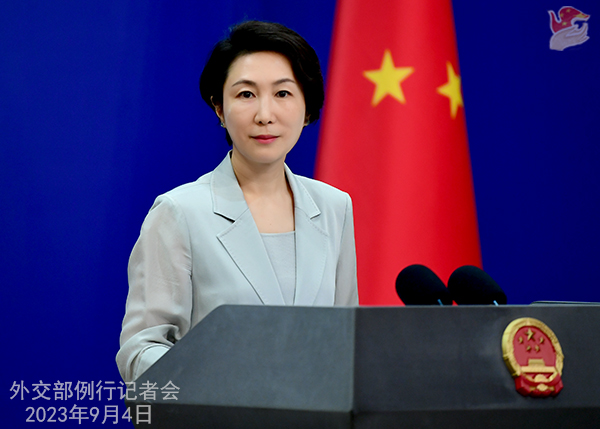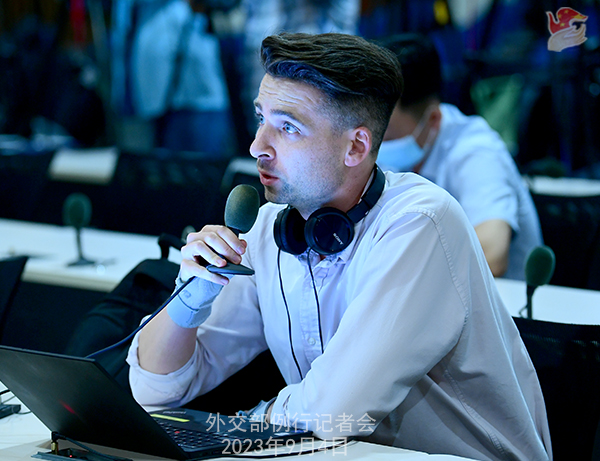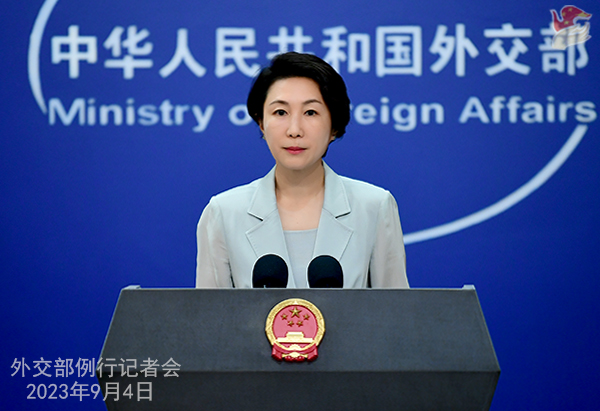| Foreign Ministry Spokesperson Mao Ning’s Regular Press Conference on September 4, 2023 |
| 2023-09-04 18:04 |
|
At the invitation of the government of the Republic of India, Premier of the State Council Li Qiang will attend the 18th G20 Summit to be held in New Delhi, India on September 9 and 10. Xinhua News Agency: Could you share China’s expectations for the G20 Summit in New Delhi? Mao Ning: As the world economy experiences more downward pressure and challenges grow for global sustainable development, it is important that the G20, being the premier forum for international economic cooperation, strengthen partnership and rise up to the big challenges facing global economy and development so as to contribute to world economic recovery and growth and global sustainable development. We hope the New Delhi summit will form consensus on that, send out a message of confidence, and promote shared prosperity and development. CCTV: Recently President Xi Jinping replied to a letter from the US-China Youth and Student Exchange Association and friends from all walks of life in Washington state of the US and a letter from the grandson of General Joseph W. Stilwell of the US respectively, both receiving positive response from China and the US as well as the international community. Can you share more details with us? Mao Ning: Recently President Xi Jinping replied to a letter from the US-China Youth and Student Exchange Association and friends from various walks of life in Washington state and a letter from a descendant of General Joseph W. Stilwell respectively. In the letters, President Xi noted that to grow China-US relations, the hope is in the people, the foundation lies among the people, and the future lies with the youth. He also underscored the need for the two peoples to strengthen exchanges, increase mutual understanding and expand cooperation so as to give incessant driving forces to this relationship. The two letters fully reflect the high importance that President Xi Jinping places on closer exchanges and communication between the people of the two countries. Over the past 40-plus years since China and the US established diplomatic ties, people-to-people exchanges have been an inexhaustible source of driving force for China-US relations. As of today, 284 pairs of friendly provinces, states and cities have been established between the two countries, and a number of practical cooperation projects have been made possible by such exchanges, bringing tangible benefits to the people of both countries. After the pandemic was over, exchanges between the peoples across various sectors have rebounded, because closer exchanges and cooperation meet the aspiration of the people and the trend of the times, and serve the fundamental interests of both countries and peoples. In handling our relations with the US, we have always observed the principles of mutual respect, peaceful coexistence and win-win cooperation proposed by President Xi Jinping as our fundamental guidance. We are committed to working with the US to explore the right way to get along with each other as two major countries, and China has always supported and encouraged people-to-people exchanges between the two countries. We hope the US will meet the aspiration of the people, work in the same direction with China, take concrete actions to deliver on the common understandings between the two presidents in their meeting in Bali, support exchanges and cooperation in various areas between the two countries, and bring bilateral relations back to the track of healthy and stable growth. AFP: You just announced that Premier Li Qiang will attend the G20 Summit. Does that mean President Xi will not attend the summit? If so, what is the reason? Mao Ning: As has been announced just now, Premier Li Qiang will lead a delegation to the New Delhi G20 Summit in India. The G20 is an important forum for international economic cooperation. China has all along attached great importance to and taken an active part in G20 events. During this year’s G20 Summit, Premier Li Qiang will share China’s views and propositions on G20 cooperation, and promote greater solidarity and cooperation among G20 countries and joint response to global economic and development challenges. We are ready to work with all parties to make the G20 Summit a success and contribute to the steady recovery of the global economy and sustainable development.
Reuters: Pope Francis sent greetings to China on Sunday, calling Chinese citizens a “noble” people and asking Catholics in China to be “good Christians and good citizens”. Is China open to upgrading its relations with the Vatican, and what conditions must be met before that can happen? Also, does China plan to reciprocate the goodwill gestures extended by the Pope while he was in Mongolia? Mao Ning: We noted the reports. My colleague shared with you China’s position last week. China is positive towards improving the relations and we are in contact and communication with the Vatican. China Daily: It was reported that China recently invited Geneva-based diplomatic envoys from developing countries to China and they paid a visit to Tibet. Can you give us more details? Mao Ning: At the invitation of China’s foreign ministry, Geneva-based diplomatic envoys from 11 developing countries, including Pakistan, Belarus, Venezuela, Cuba and Nicaragua, came to China and paid a visit to Tibet from August 27 to September 2. The envoys spoke highly of China’s people-centered development approach and efforts in fully safeguarding human rights of people of all ethnic groups. They said that the progress achieved in various sectors in Tibet exceeds expectation and the fruits of development are truly shared by the people there—a vivid example that a happy life for all is what human rights protection is all about. The envoys observed bilingual classes in local middle and elementary schools, watched courses on Tibetan music, dancing, calligraphy, innovation and artificial intelligence, and visited the dormitories and canteens of boarding middle schools. The 15-year free education in Tibet received recognition from the envoys. They said that given the vast area of Tibet, providing boarding schooling to local students is an effective way of ensuring the equal right to high-quality education among children of all ethnic groups and that China provides a stellar example for all countries in protecting people’s right to education. The envoys spoke highly of China’s tremendous efforts in safeguarding the freedom of religious belief, protecting religious relics and carrying forward Tibetan medicine. They said that the lies about Tibet fabricated by some western countries couldn’t be further from the truth. The international community will not be deceived by these lies. The achievement China has made attests to the importance that countries need to pursue their own path of human rights development that suits their national realities. The envoys expressed readiness to enhance exchanges and cooperation with China, strengthen multilateral coordination on human rights affairs, jointly oppose the politicization of human rights, safeguard international fairness and justice and advance the sound development of the international human rights cause. Shenzhen TV: On August 31, the US National Oceanic and Atmospheric Administration (NOAA) released its 2023 Report to Congress on Improving International Fisheries Management. The report identifies China as engaged in illegal, unreported and unregulated (IUU) fishing. What’s your comment? Mao Ning: According to international law and customary international practice, the subjects of IUU activities are fishing vessels. The IUU activities of individual fishing vessels should not be attributed to their countries. There is no legal basis whatsoever for the US to broadly identify a nation for IUU fishing based on the activities conducted by a small number of fishing vessels. Such sweeping identification seriously disrupts international fisheries cooperation—nothing but political manipulation. China is a responsible country and deeply committed to science-based conservation and sustainable use of international fisheries resources. China exercises the right to develop and use the fisheries resources on the high seas in accordance with relevant international law including UNCLOS. We actively fulfill our international obligations, and have put in place a complete system of distant-water fisheries management. We follow the world’s most rigorous steps in vessel position monitoring and management, and we have taken the lead in implementing voluntary fishing moratoriums in certain parts of the high seas and worked with the international community to crack down on IUU fishing. China has joined eight regional fisheries management organizations including the International Commission for the Conservation of Atlantic Tunas, and our compliance record has always ranked high in all of those organizations. By contrast, the US has exceeded catch limits for tuna in western and central Pacific Ocean in violation of relevant international laws over the years. What is more, at the recent annual meeting of the Inter-American Tropical Tuna Commission, the US was found suspected of 13 IUU fishing activities—more than any other member countries—which involve the fishing of whale sharks and turtles and harming sharks. Before identifying other nations as engaged in IUU fishing without valid reasons, the US needs to first of all take a hard look at itself and think seriously about how to stop the IUU fishing activities of its own fishing vessels.
Reuters: Australia said it would send additional police to Solomon Islands to boost security there and keep the police force there until June to assist with the general election. Does China plan to work alongside Australia, Fiji, New Zealand and Papua New Guinea in Solomon Islands, to bolster the islands’ domestic security? What is the extent of China’s police presence so far after signing the pact with Solomon Islands on police cooperation? Mao Ning: The police and law enforcement cooperation between China and Solomon Islands has played a positive role in enhancing security and stability in Solomon Islands. China will continue to support the country in achieving lasting security to the best of our capability in light of the will and needs of Solomon Islands. Dragon TV: According to reports, when meeting with Chairman Luo Zhaohui of China International Development Cooperation Agency (CIDCA) recently, Mongolian Prime Minister Luvsannamsrai Oyun-Erdene said that Mongolia is ready to step up development cooperation with China in areas such as desertification prevention and control under the framework of the Belt and Road Initiative (BRI) and the Global Development Initiative (GDI). The two sides also unveiled the China-Mongolia Desertification Prevention and Control Cooperation Center on the same day. Do you have any comment? Mao Ning: Strengthening cooperation on desertification prevention and control is an important common understanding reached by the leaders of China and Mongolia and a good example of building a China-Mongolia community with a shared future. The establishment of the China-Mongolia Desertification Prevention and Control Cooperation Center is an important way of supporting Mongolia in implementing its plan to plant one billion trees. It shows China’s commitment to the principle of amity, sincerity, mutual benefit and inclusiveness and to friendship and partnership in its diplomacy with its neighbors. We believe that with the joint efforts of both sides and the support from the international community, China-Mongolia cooperation on desertification prevention and control will bring tangible benefits to the two countries and the rest of the region. Reuters: US President Biden plans to visit Viet Nam this month and reports are saying that the US and Viet Nam may upgrade their diplomatic relations. What is China’s comment on this? Mao Ning: In our view, in handling relations with Asian countries, the US needs to give up the zero sum game and Cold War mentality, observe the basic norms governing international relations, refrain from targeting any third party, and avoid undermining regional peace, stability, development and prosperity. Bloomberg: You just mentioned that Premier Li will be leading the delegation to the G20 and I understand this would mean that President Xi will not attend the G20. Do you have any comments on why he may not be attending? Mao Ning: I have made the announcement just now and shared with you the information I have. Anadolu Agency: If I’m not mistaken, it is the first time the Chinese leader doesn’t participate himself in a leader’s summit section of the G20. What is the reason of this arrangement? Mao Ning: I already covered this. The G20 is the premier forum for international economic cooperation. China attaches high importance to and actively participates in G20 activities.
|
 | ||||||||||||
 | ||||||||||||
|



